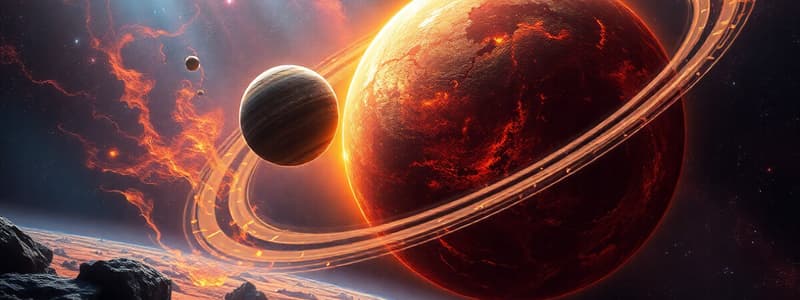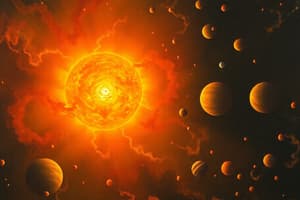Podcast
Questions and Answers
What is the lowest layer of the atmosphere where most of Earth's weather occurs?
What is the lowest layer of the atmosphere where most of Earth's weather occurs?
- Troposphere (correct)
- Stratosphere
- Mesosphere
- Thermosphere
Which theory suggests that the solar system formed from collisions between celestial bodies?
Which theory suggests that the solar system formed from collisions between celestial bodies?
- Jeans-Jeffreys Tidal Theory
- Kant-Laplace Nebular Theory
- Buffon's Collision Theory (correct)
- Solar Nebular Theory
The Solar Nebular Theory (SNT) describes the formation of the solar system from what?
The Solar Nebular Theory (SNT) describes the formation of the solar system from what?
- A massive asteroid belt
- A series of astronomical collisions
- A rotating cloud of gas and dust (correct)
- A giant planet
How do planets in the solar system move in relation to the sun?
How do planets in the solar system move in relation to the sun?
Which theory explains the formation of the solar system through gravitational interactions and tidal forces?
Which theory explains the formation of the solar system through gravitational interactions and tidal forces?
Which Earth sphere encompasses all living organisms and ecosystems, including plants and animals?
Which Earth sphere encompasses all living organisms and ecosystems, including plants and animals?
What is the primary responsibility of the cryosphere?
What is the primary responsibility of the cryosphere?
Which layer of the atmosphere is known for containing very sparse particles and gradually fades into space?
Which layer of the atmosphere is known for containing very sparse particles and gradually fades into space?
What component primarily consists of rocks, soil, and the Earth's surface features including mountains and earthquakes?
What component primarily consists of rocks, soil, and the Earth's surface features including mountains and earthquakes?
What term is used to refer to one of the two halves of the Earth located north of the equator?
What term is used to refer to one of the two halves of the Earth located north of the equator?
Which Earth sphere is responsible for covering about 75% of the planet's surface?
Which Earth sphere is responsible for covering about 75% of the planet's surface?
Which sphere includes the inner and outer layers of the Earth, including the crust and core?
Which sphere includes the inner and outer layers of the Earth, including the crust and core?
What is a characteristic of the mesosphere?
What is a characteristic of the mesosphere?
Which layer of the atmosphere contains electrically charged particles and is crucial for satellite communication?
Which layer of the atmosphere contains electrically charged particles and is crucial for satellite communication?
What is the rigid outer layer of Earth that includes the crust and uppermost part of the mantle called?
What is the rigid outer layer of Earth that includes the crust and uppermost part of the mantle called?
Which atmospheric layer is known for experiencing the coldest temperatures where meteors disintegrate?
Which atmospheric layer is known for experiencing the coldest temperatures where meteors disintegrate?
Which protective layer around the Earth helps to deflect harmful solar wind and cosmic rays?
Which protective layer around the Earth helps to deflect harmful solar wind and cosmic rays?
What layer of the atmosphere contains the ozone layer that protects us from ultraviolet solar radiation?
What layer of the atmosphere contains the ozone layer that protects us from ultraviolet solar radiation?
Which layer of the atmosphere is characterized by very high temperatures where satellites orbit?
Which layer of the atmosphere is characterized by very high temperatures where satellites orbit?
In which layer of Earth are tectonic plates found?
In which layer of Earth are tectonic plates found?
Which atmospheric layer is located between the stratosphere and thermosphere?
Which atmospheric layer is located between the stratosphere and thermosphere?
What is the primary characteristic of asteroids?
What is the primary characteristic of asteroids?
Which planets are classified as terrestrial planets?
Which planets are classified as terrestrial planets?
What defines Jovian planets?
What defines Jovian planets?
What does the term 'accretion' refer to in the context of space?
What does the term 'accretion' refer to in the context of space?
Which structure surrounds our solar system and is known for its icy objects?
Which structure surrounds our solar system and is known for its icy objects?
In what layer of Earth do tectonic plates float?
In what layer of Earth do tectonic plates float?
What is the main concept of the Nebular Theory?
What is the main concept of the Nebular Theory?
What is the significance of the heliocentric model?
What is the significance of the heliocentric model?
Flashcards
What are asteroids?
What are asteroids?
Small, rocky objects in space, mostly found between Mars and Jupiter.
What are planetesimals?
What are planetesimals?
Tiny building blocks of planets that formed from dust and gas in space.
What are terrestrial planets?
What are terrestrial planets?
Refers to rocky planets like Earth, Mars, Venus, and Mercury.
What are Jovian planets?
What are Jovian planets?
Signup and view all the flashcards
What is accretion?
What is accretion?
Signup and view all the flashcards
What are the inner planets?
What are the inner planets?
Signup and view all the flashcards
What are the outer planets?
What are the outer planets?
Signup and view all the flashcards
What is the geocentric model?
What is the geocentric model?
Signup and view all the flashcards
Biosphere
Biosphere
Signup and view all the flashcards
Cryosphere
Cryosphere
Signup and view all the flashcards
Exosphere
Exosphere
Signup and view all the flashcards
Geosphere
Geosphere
Signup and view all the flashcards
Hemisphere
Hemisphere
Signup and view all the flashcards
Hydrosphere
Hydrosphere
Signup and view all the flashcards
Atmosphere
Atmosphere
Signup and view all the flashcards
Earth's surface
Earth's surface
Signup and view all the flashcards
What is the Ionosphere?
What is the Ionosphere?
Signup and view all the flashcards
What is the Lithosphere?
What is the Lithosphere?
Signup and view all the flashcards
What is the Magnetosphere?
What is the Magnetosphere?
Signup and view all the flashcards
What is the Mesosphere?
What is the Mesosphere?
Signup and view all the flashcards
What is the Stratosphere?
What is the Stratosphere?
Signup and view all the flashcards
What is the Thermosphere?
What is the Thermosphere?
Signup and view all the flashcards
What is the troposphere?
What is the troposphere?
Signup and view all the flashcards
What is the Solar Nebular Theory?
What is the Solar Nebular Theory?
Signup and view all the flashcards
What is Buffon's Collision Theory?
What is Buffon's Collision Theory?
Signup and view all the flashcards
What is the Kant-Laplace Nebular Theory?
What is the Kant-Laplace Nebular Theory?
Signup and view all the flashcards
What is the Jeans-Jeffreys Tidal Theory?
What is the Jeans-Jeffreys Tidal Theory?
Signup and view all the flashcards
Study Notes
Solar System Formation Theories
- Planets orbit the Sun in nearly circular paths, counterclockwise.
- Planet arrangement follows a specific pattern based on distance from the Sun, influenced by gravity.
- Theories explaining solar system formation include:
- Buffon's Collision Theory: Suggests a celestial collision created the solar system's structures.
- Kant-Laplace Nebular Theory: Proposes that a gas cloud (solar nebula) collapsed into the Sun and planets, due to spinning and contraction.
- Jeans-Jeffreys Tidal Theory: Explains planet formation via gravitational interaction with nearby stars.
- Solar Nebular Theory (SNT): A modern theory suggesting solar system formation from a rotating cloud of gas and dust, which flattened into a disk, forming the Sun and planets.
Studying That Suits You
Use AI to generate personalized quizzes and flashcards to suit your learning preferences.




